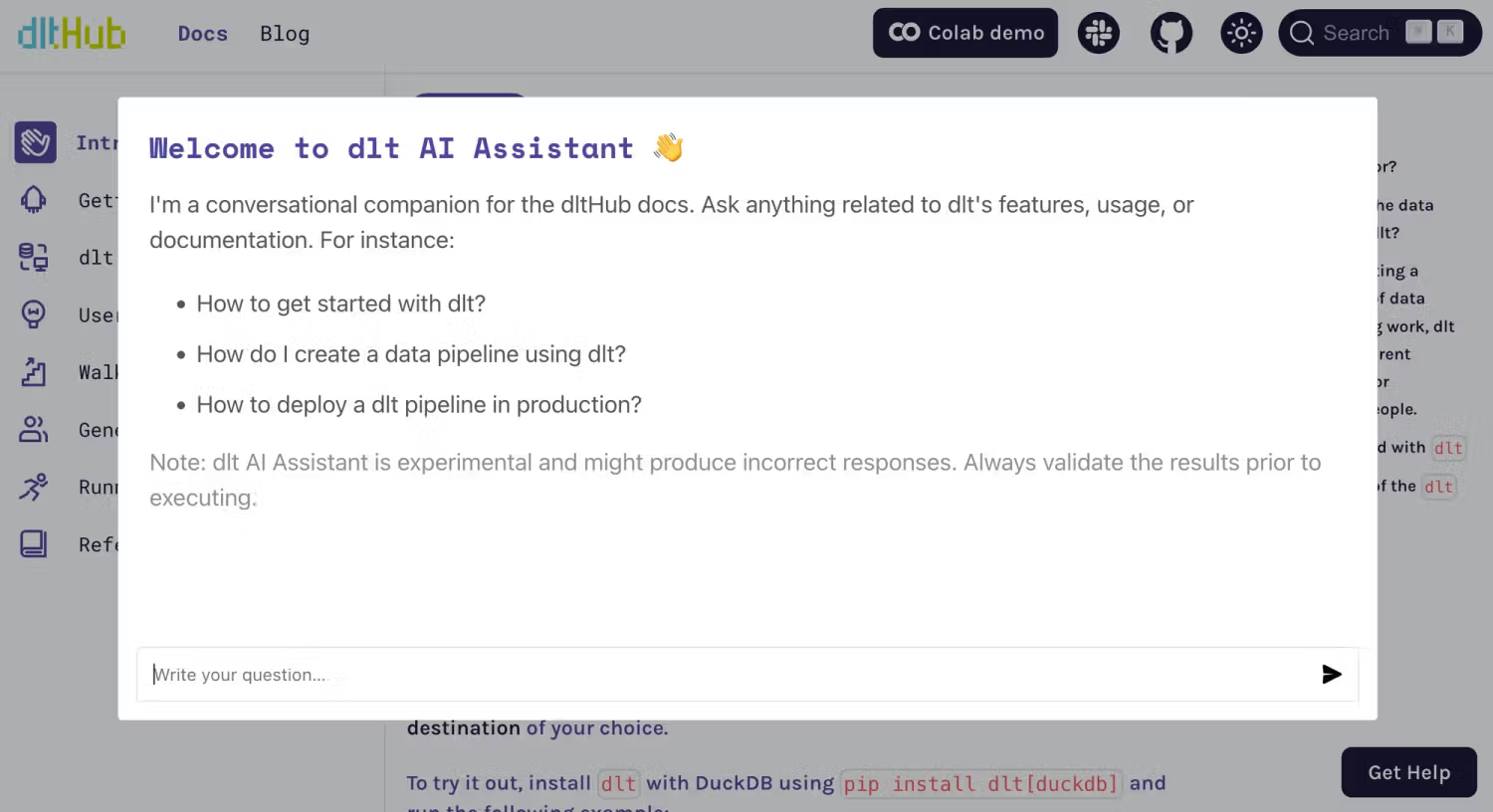Saving 75% of work for a Chargebee Custom Source via pipeline code generation with dlt
 Adrian Brudaru,
Adrian Brudaru,
Co-Founder & CDO Violetta Mishechkina,
Violetta Mishechkina,
Head of Solutions Engineering
At dltHub, we have been pioneering the future of data pipeline generation, making complex processes simple and scalable. We have not only been building dlt for humans but also LLMs.
Pipeline generation on a simple level is already possible directly in ChatGPT chats - just ask for it. But doing it at scale, correctly, and producing comprehensive, good-quality pipelines is a much more complex endeavour.
Our early exploration of code generation
As LLMs became available at the end of 2023, we were already uniquely positioned to be part of the wave. By being a library, an LLM could use dlt to build pipelines without the complexities of traditional ETL tools.
This raised from the start the question - what are the different levels of pipeline quality? For example, how does a user code snippet, which formerly had value, compare to LLM snippets which can be generated en-masse? What does a perfect pipeline look like now, and what can LLMs do?
We were only able to answer some of these questions, but we had some concrete outcomes that we carry into the future.
In June ‘23 we added a GPT-4 docs helper that generates snippets
- try it on our docs; it's widely used as code troubleshooter

We created an OpenAPI-based pipeline generator
- Blog: https://dlthub.com/docs/blog/open-api-spec-for-dlt-init
- OpenApi spec describes the API; Just as we can create swagger docs or a Python API wrapper, we can create pipelines.
- Demo
Running into early limits of LLM automation: A manual last mile is needed
Ideally, we would love to point a tool at an API or doc of the API, and just have the pipeline generated.
However, the OpenApi spec does not contain complete information for generating a complete pipeline. There’s many challenges to overcome and gaps that need to be handled manually.
While LLM automation can handle the bulk, some customisation remains manual, generating requirements towards our ongoing efforts of full automation.
Why revisit code generation at dlt now?
Growth drives a need for faster onboarding
The dlt community has been growing steadily in recent months. In February alone we had a 25% growth on Slack and even more in usage.
New users generate a lot of questions and some of them use our onboarding program, where we speed-run users through any obstacles, learning how to make things smoother on the dlt product side along the way.
Onboarding usually means building a pipeline POC fast
During onboarding, most companies want to understand if dlt fits their use cases. For these purposes, building a POC pipeline is pretty typical.
This is where code generation can prove invaluable - and reducing a build time from 2-3d to 0.5 would lower the workload for both users and our team. 💡 To join our onboarding program, fill out this form to request a call.
Case Study: How our solution engineer Violetta used our PoC to generate a production-grade Chargebee pipeline within hours
In a recent case, one of our users wanted to try dlt with a source we did not list in our public sources - Chargebee.
Since the Chargebee API uses the OpenAPI standard, we used the OpenAPI PoC dlt pipeline code generator that we built last year.
Starting resources
POC for getting started, human for the last mile.
- Blog post with a video guide https://dlthub.com/docs/blog/open-api-spec-for-dlt-init
- OpenAPI Proof of Concept pipeline generator: https://github.com/dlt-hub/dlt-init-openapi
- Chargebee openapi spec https://github.com/chargebee/openapi
- Understanding of how to make web requests
- And 4 hours of time - this was part of our new hire Violetta’s onboarding tasks at dltHub so it was her first time using dlt and the code generator.
Onward, let’s look at how our new colleague Violetta, ML Engineer, used this PoC to generate PoCs for our users.
Violetta shares her experience:
So the first thing I found extremely attractive — the code generator actually created a very simple and clean structure to begin with.
I was able to understand what was happening in each part of the code. What unfortunately differs from one API to another — is the authentication method and pagination. This needed some tuning. Also, there were other minor inconveniences that I needed to handle.
There were no great challenges. The most difficult tedious probably was to manually change pagination in different sources and rename each table.
- Authentication The provided Authentication was a bit off. The generated code assumed the use of a username and password but what was actually required was — an empty username + api_key as a password. So super easy fix was changing
def to_http_params(self) -> CredentialsHttpParams:
cred = f"{self.api_key}:{self.password}" if self.password else f"{self.username}"
encoded = b64encode(f"{cred}".encode()).decode()
return dict(cookies={}, headers={"Authorization": "Basic " + encoded}, params={})to
def to_http_params(self) -> CredentialsHttpParams:
encoded = b64encode(f"{self.api_key}".encode()).decode()
return dict(cookies={}, headers={"Authorization": "Basic " + encoded}, params={})Also, I was pleasantly surprised that the generator had several different authentication methods built in and I could easily replace BasicAuth with BearerAuth of OAuth2 for example.
- Pagination
For the code generator, it’s hard to guess a pagination method by OpenAPI specification, so the generated code has no pagination 😞. So I had to replace a line
def f():
yield _build_response(requests.request(**kwargs))with yielding from a 6-lines get_page function
def get_pages(kwargs: Dict[str, Any], data_json_path):
has_more = True
while has_more:
response = _build_response(requests.request(**kwargs))
yield extract_nested_data(response.parsed, data_json_path)
kwargs["params"]["offset"] = response.parsed.get("next_offset", None)
has_more = kwargs["params"]["offset"] is not NoneThe downside — I had to do it for each resource.
- Too many files
The code wouldn’t run because it wasn’t able to find some models. I found a commented line in the generator script
# self._build_models()I regenerated the code with an uncommented line and understood why it was commented. Code created 224 .py files under the models directory. Turned out I needed only two of them. Those were models used in API code. So I just removed the other 222 garbage files and forgot about them.
- Namings
The only problem I was left with — namings. The generated table names were like ListEventsResponse200ListItem or ListInvoicesForACustomerResponse200ListItem . I had to go and change them to something more appropriate like events and invoices .
The result
Result: https://github.com/dlt-hub/chargebee-source
I did a walk-through with our user. Some additional context started to appear. For example, which endpoints needed to be used with replace write disposition, which would require specifying the merge keys. So in the end this source would still require some testing to be performed and some fine-tuning from the user. I think the silver lining here is how to start. I don’t know how much time I would’ve spent on this source if I started from scratch. Probably, for the first couple of hours, I would be trying to decide where should the authentication code go, or going through the docs searching for information on how to use dlt configs. I would certainly need to go through all API endpoints in the documentation to be able to find the one I needed. There are a lot of different things which could be difficult especially if you’re doing it for the first time. I think in the end if I had done it from scratch, I would’ve got cleaner code but spent a couple of days. With the generator, even with finetuning, I spent about half a day. And the structure was already there, so it was overall easier to work with and I didn’t have to consider everything upfront.
We are currently working on making full generation a reality.
- Stay tuned for more, or
Join our Slack community to take part in the conversation.